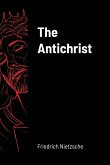Nietzsche's famous attack upon established Christianity and religion is brought to the reader in this superb hardcover edition of The Antichrist, introduced and translated by H.L. Mencken. The incendiary tone throughout The Antichrist separates it from most other well-regarded philosophical texts; even in comparison to Nietzsche's earlier works, the tone of indignation and conviction behind each argument made is evident. There is little lofty ponderousness; the book presents its arguments and points at a blistering pace, placing itself among the most accessible and comprehensive works of philosophy. The Antichrist comprises a total of sixty-two short chapters, each with distinct philosophical arguments or angle upon the targets of Christianity, organised religion, and those who masquerade as faithful but are in actuality anything but. Pointedly opposed to notions of Christian morality and virtue, Nietzsche vehemently sets out a case for the faith's redundancy and lack of necessity in human life.
Hinweis: Dieser Artikel kann nur an eine deutsche Lieferadresse ausgeliefert werden.
Hinweis: Dieser Artikel kann nur an eine deutsche Lieferadresse ausgeliefert werden.








